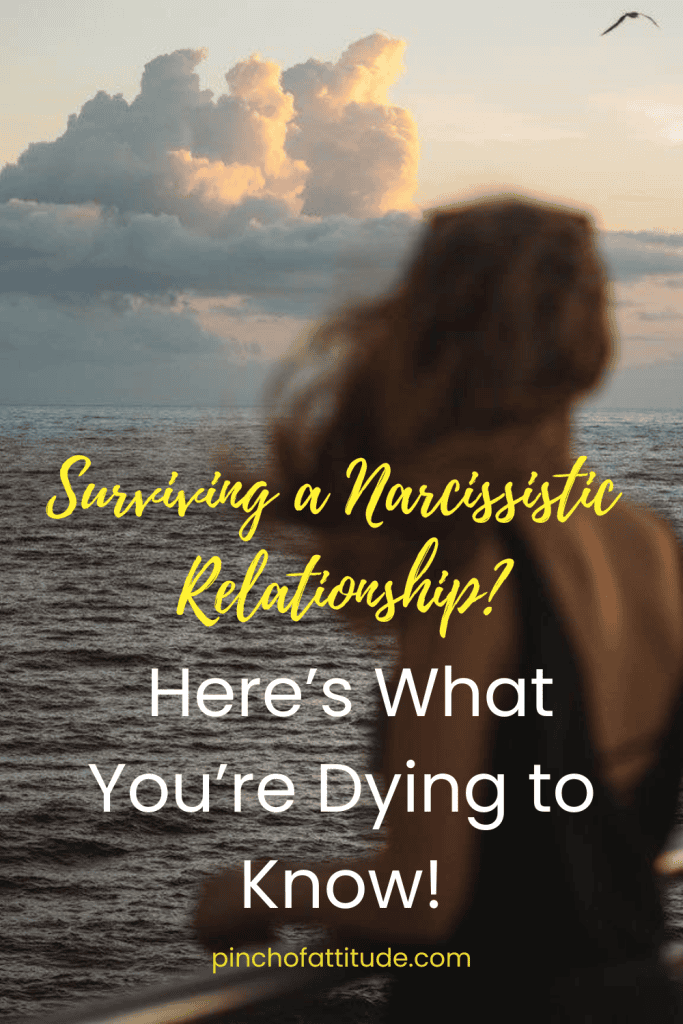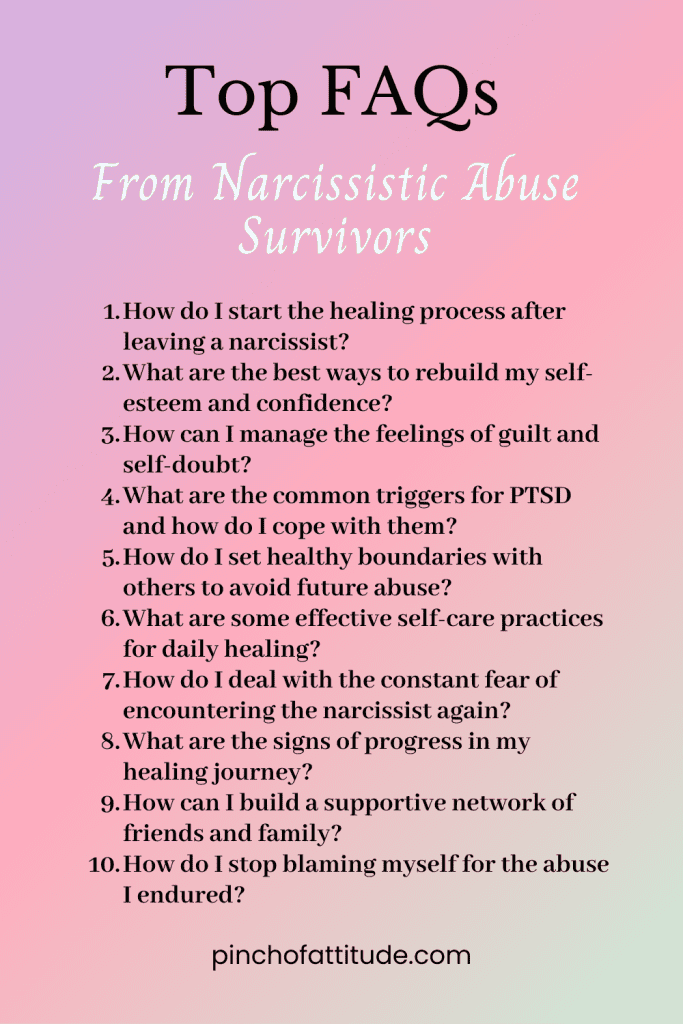Alright, let’s get real. Surviving narcissistic abuse is like emerging from a war zone. I’ve been there many many years ago.
It’s brutal and messy and it leaves scars, deep, deep scars.
But guess what? You’re here, and that’s a victory in itself.
I’ve been through 30 years of this painful journey, and I’m here to tell you it’s possible to not just survive but thrive.
You don’t need fancy therapy sessions or magic potions.
What you need is grit, a supportive environment, and a relentless commitment to your own damn well-being.
Let’s get into some no-nonsense answers to the toughest questions survivors like us face.
- Healing from narcissistic abuse requires a supportive environment, self-compassion, and practical strategies for managing triggers and rebuilding self-esteem.
- Setting clear boundaries and practicing self-care are essential steps in protecting yourself and fostering long-term recovery.
- Rebuilding trust in others and yourself is a gradual process that starts with small acts of trust and self-forgiveness.
Table of Contents
1. How do I start the healing process after leaving a narcissist?

The best way that worked for me and others I helped along the way was by starting to acknowledge the pain and allowing myself to grieve.
This is an essential step because it validates your experience. Surround yourself with supportive people who understand your situation.
Joining a support group, whether online or in person, can provide a sense of community and understanding.
I’m not big on writing but I know a lot of people find journaling their thoughts and emotions can be incredibly therapeutic, helping them process and release pent-up feelings.
Additionally, educate yourself about narcissistic abuse to understand what happened and why, which can be empowering.
2. What are the best ways to rebuild my self-esteem and confidence?
I would highly recommend focusing on small victories and celebrating them.
Each step forward, no matter how small, is a win trust me!
Practice positive affirmations daily to reinforce your worth and understand that none of this bullshit is your fault.
Write down affirmations and place them where you can see them every day.
Engage in activities you love and are good at to remind yourself of your strengths.
This could be anything from cooking to painting to sports.
Volunteering can also boost your self-worth by allowing you to help others and see the positive impact you can have.
3. How can I manage the feelings of guilt and self-doubt?

Just know that it’s very normal to feel that way when you just got out of the abuse.
What you can do is start by reminding yourself that the abuse was not your fault.
Narcissists are experts at shifting blame. Write down the reasons why you deserve love and respect, and revisit this list whenever self-doubt creeps in.
Meditation and mindfulness for 5 minutes daily can help you stay grounded and clear-headed.
These practices teach you to observe your thoughts without judgment, which can reduce the power of negative self-talk.
Consider reading books or listening to podcasts on self-compassion to deepen your understanding and practice of it.
4. What are the common triggers for PTSD and how do I cope with them?
Triggers can be anything from certain smells, sounds, or places that remind you of the abuse.
When you feel triggered, practice deep breathing, grounding techniques (like focusing on your surroundings), or distraction methods like listening to music or taking a walk.
I know it will not be easy at first but keep trying.
Keep a list of grounding techniques handy so you can quickly reference them when needed.
Consider creating a “safe space” at home with comforting items like blankets, candles, or pictures that help soothe you.
5. How do I set healthy boundaries with others to avoid future abuse?

Be clear about your limits and communicate them assertively.
Use “I” statements to express how you feel and what you need, such as “I feel overwhelmed when I’m interrupted; I need some quiet time to focus.”
Don’t be afraid to say no when necessary, and remember that setting boundaries is a form of self-respect.
Surround yourself with people who respect your boundaries and encourage healthy interactions.
Practice boundary-setting regularly, even in small situations, to build your confidence.
Stay away from those who don’t respect your limits because they are often the same narcissistic abuser you dealt with before.
6. What are some effective self-care practices for daily healing?
Make time for activities that nourish your body and soul, such as exercise, reading, or spending time in nature.
Prioritize sleep and a healthy diet, as physical well-being directly impacts emotional health.
Regularly engage in hobbies that bring you joy and relaxation.
Consider incorporating practices like yoga or meditation, which can help reduce stress and improve your overall sense of well-being.
Creating a daily routine that includes self-care can help make it a consistent part of your life.
7. How do I deal with the constant fear of encountering the narcissist again?
This feeling is super normal.
As long as you have a plan in place for what to do if you see them, such as leaving the area or calling a friend for support.
Practice visualization techniques to imagine yourself confidently handling the situation.
This mental rehearsal can reduce anxiety and prepare you for real-life encounters.
Seek support from friends or a support group to talk about your fears and get reassurance.
Remember that avoidance isn’t a weakness; it’s a strategy to protect your mental health.
8. What are the signs of progress in my healing journey?

You start to have more good days than bad, and your emotional reactions become less intense.
You feel more in control of your emotions and can think about the past without as much pain.
You begin to look forward to the future and make plans that excite you. Track your progress by keeping a journal of your thoughts, feelings, and accomplishments.
Celebrate milestones, no matter how small, to acknowledge your growth and perseverance.
9. How can I build a supportive network of friends and family?
Reach out to old friends and reconnect, explaining your situation if you feel comfortable.
Join support groups or clubs related to your interests to meet new people who share common goals.
Be open about your experiences with people you trust, which can deepen your relationships and help them understand your needs.
Don’t hesitate to distance yourself from those who are unsupportive or toxic.
Building a supportive network takes time, so be patient and persistent.
10. How do I stop blaming myself for the abuse I endured?

Understand that narcissists are skilled manipulators who create environments where their victims feel at fault.
Write down the ways you were manipulated and how it wasn’t your fault, and revisit this list to reinforce your understanding.
Talk to others who have been through similar experiences to gain perspective and validation.
Engage in self-compassion exercises, reminding yourself that you did the best you could in a very difficult situation.
11. What are the long-term effects of narcissistic abuse on mental health?

Long-term effects can include anxiety, depression, and PTSD.
It’s important to be patient with yourself and seek healthy ways to manage these conditions.
Regular exercise, hobbies, and talking to supportive friends can help.
Consider exploring holistic approaches like acupuncture, aromatherapy, or mindfulness practices.
If therapy isn’t an option, self-help books and online resources can provide valuable strategies and support.
12. How can I trust people again after experiencing such betrayal?
Take it slow and start with small acts of trust. It took a while for me to trust others again but I did it.
Pay attention to people’s actions over time rather than their words, as consistency is key.
Surround yourself with people who have proven to be trustworthy.
Share gradually and observe how they handle your trust.
Building trust is a process, so give yourself time and don’t rush it. It’s okay to be cautious and protect yourself.
13. How do I deal with the memories and flashbacks of the abuse?

I have that from time to time, so it’s quite normal. So, when memories arise, acknowledge them without judgment.
Practice grounding techniques like focusing on your breath or describing your surroundings to bring yourself back to the present moment.
Writing about your experiences can help process them and reduce their emotional charge.
Create a “safe space” at home with comforting items that help soothe you when memories surface.
Engaging in creative outlets like art or music can also help express and release pent-up emotions.
14. What are the steps to forgive myself and move forward?

Accept that you did the best you could with the knowledge you had at the time.
Practice self-compassion and remind yourself that healing is a journey.
Focus on your strengths and the progress you’ve made.
Write a letter to yourself expressing forgiveness and understanding.
Engage in activities that reinforce your self-worth and remind you of your resilience.
Surround yourself with positive influences who uplift and support you.
15. How do I handle the narcissist’s attempts to contact or manipulate me post-breakup?
You can’t stop narcissists from trying but you must cut off all contact if possible.
Block them on all platforms and change your contact information if necessary. If contact is unavoidable, keep interactions brief and emotionless.
Document any attempts at manipulation for your records.
Seek support from friends or support groups when you feel vulnerable.
Having a strong support network can provide reassurance and practical advice on how to handle these situations.
Remember, maintaining no contact is crucial for your healing and well-being.
Here’s How I Can Help
you’ve asked even one of these questions, you’re not broken, you’re healing. I’m proud of you!
And healing from narcissistic abuse isn’t linear or easy, but it is absolutely possible.
I know because I’ve lived through it, clawed my way out, and built something better from the wreckage.
This isn’t about just surviving anymore, it’s about finally living without fear, guilt, or self-doubt.
You don’t need to have all the answers. You just need the right support, the right tools, and a fierce commitment to yourself.
That’s why I created The Next Chapter, a step-by-step roadmap for survivors like us who are ready to rebuild, rise, and reclaim peace.
You’re not crazy. You’re not alone. And you’re damn sure not done.
Related Posts:






Kolyanne,
This is excellent.
Many thanks !
I’m just glad I am away from those people who are so evil can rebuild my life.